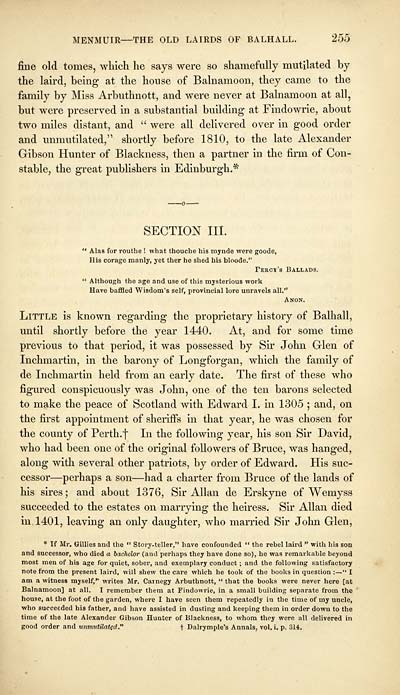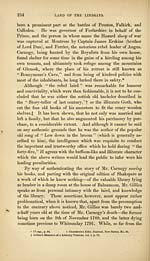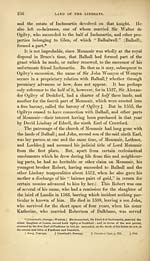Download files
Complete book:
Individual page:
Thumbnail gallery: Grid view | List view

MENMUIR — THE OLD LAIRDS OF BALHALL. 255
fine old tomes, which he says were so shamefully mutilated by
the laird, being at the house of Balnamoon, they came to the
family by Miss Arbuthnott, and were never at Balnamoon at all,
but were preserved in a substantial building at Findowrie, about
two miles distant, and " were all delivered over in good order
and unmutilated," shortly before 1810, to the late Alexander
Gibson Hunter of Blackness, then a partner in the firm of Con-
stable, the great publishers in Edinburgh.*
SECTION III.
" Alas for routhe ! what thouche his mynde were goode,
His corage manly, yet ther he shed his bloode."
Term's Ballads.
" Although the age and use of this mysterious work
Have baffled Wisdom's self, provincial lore unravels all."
Anon.
Little is known regarding the proprietary history of Balhall,
until shortly before the year 1440. At, and for some time
previous to that period, it was possessed by Sir John Glen of
Inchmartin, in the barony of Longforgan, which the family of
de Inchmartin held from an early date. The first of these who
figured conspicuously was John, one of the ten barons selected
to make the peace of Scotland with Edward I. in 1305 ; and, on
the first appointment of sheriffs in that year, he was chosen for
the county of Perth.f In the following year, his son Sir David,
who had been one of the original followers of Bruce, was hanged,
along with several other patriots, by order of Edward. His suc-
cessor — perhaps a son — had a charter from Bruce of the lands of
his sires ; and about 1376, Sir Allan de Erskyne of Wemyss
succeeded to the estates on marrying the heiress. Sir Allan died
in 1401, leaving an only daughter, who married Sir John Glen,
* If Mr. Gillies and the " Story-teller," have confounded " the rebel laird " with his son
and successor, who died a bachelor (and perhaps they have done so), he was remarkable beyond
most men of his age for quiet, sober, and exemplary conduct ; and the following satisfactory
note from the present laird, will shew the care which he took of the books in question :— " I
am a witness myself," writes Mr. Camegy Arbuthnott, "that the books were never here [at
Balnamoon] at all. I remember them at Findowrie, in a small building separate from the
house, at the foot of the garden, where I have seen them repeatedly in the time of my uncle,
who succeeded his father, and have assisted in dusting and keeping them in order down to the
time of the late Alexander Gibson Hunter of Blackness, to whom they were all delivered in
good order and unmutilated." t Dalrymple's Annals, vol. i. p. 314.
fine old tomes, which he says were so shamefully mutilated by
the laird, being at the house of Balnamoon, they came to the
family by Miss Arbuthnott, and were never at Balnamoon at all,
but were preserved in a substantial building at Findowrie, about
two miles distant, and " were all delivered over in good order
and unmutilated," shortly before 1810, to the late Alexander
Gibson Hunter of Blackness, then a partner in the firm of Con-
stable, the great publishers in Edinburgh.*
SECTION III.
" Alas for routhe ! what thouche his mynde were goode,
His corage manly, yet ther he shed his bloode."
Term's Ballads.
" Although the age and use of this mysterious work
Have baffled Wisdom's self, provincial lore unravels all."
Anon.
Little is known regarding the proprietary history of Balhall,
until shortly before the year 1440. At, and for some time
previous to that period, it was possessed by Sir John Glen of
Inchmartin, in the barony of Longforgan, which the family of
de Inchmartin held from an early date. The first of these who
figured conspicuously was John, one of the ten barons selected
to make the peace of Scotland with Edward I. in 1305 ; and, on
the first appointment of sheriffs in that year, he was chosen for
the county of Perth.f In the following year, his son Sir David,
who had been one of the original followers of Bruce, was hanged,
along with several other patriots, by order of Edward. His suc-
cessor — perhaps a son — had a charter from Bruce of the lands of
his sires ; and about 1376, Sir Allan de Erskyne of Wemyss
succeeded to the estates on marrying the heiress. Sir Allan died
in 1401, leaving an only daughter, who married Sir John Glen,
* If Mr. Gillies and the " Story-teller," have confounded " the rebel laird " with his son
and successor, who died a bachelor (and perhaps they have done so), he was remarkable beyond
most men of his age for quiet, sober, and exemplary conduct ; and the following satisfactory
note from the present laird, will shew the care which he took of the books in question :— " I
am a witness myself," writes Mr. Camegy Arbuthnott, "that the books were never here [at
Balnamoon] at all. I remember them at Findowrie, in a small building separate from the
house, at the foot of the garden, where I have seen them repeatedly in the time of my uncle,
who succeeded his father, and have assisted in dusting and keeping them in order down to the
time of the late Alexander Gibson Hunter of Blackness, to whom they were all delivered in
good order and unmutilated." t Dalrymple's Annals, vol. i. p. 314.
Set display mode to:
![]() Universal Viewer |
Universal Viewer | ![]() Mirador |
Large image | Transcription
Mirador |
Large image | Transcription
Images and transcriptions on this page, including medium image downloads, may be used under the Creative Commons Attribution 4.0 International Licence unless otherwise stated. ![]()
| Histories of Scottish families > History and traditions of the land of the Lindsays in Angus and Mearns > (273) Page 255 |
|---|
| Permanent URL | https://digital.nls.uk/94872302 |
|---|
| Description | A selection of almost 400 printed items relating to the history of Scottish families, mostly dating from the 19th and early 20th centuries. Includes memoirs, genealogies and clan histories, with a few produced by emigrant families. The earliest family history goes back to AD 916. |
|---|

